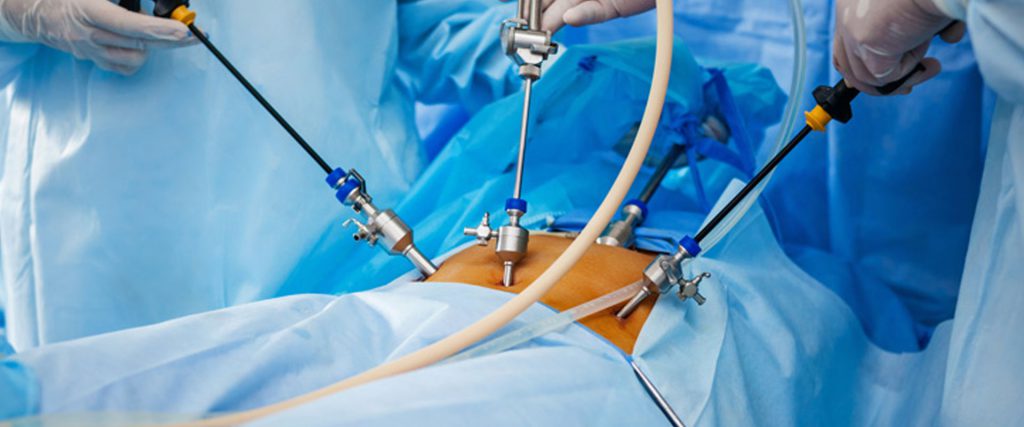Gynaecology

Laparoscopy / Hysteroscopy
A gynaecological laparoscopy is a procedure that allows a surgeon to look inside your pelvis, for example at your fallopian tubes, ovaries and uterus (womb). It can be used either to diagnose a condition or for treatment.
Laparoscopy is almost always performed under general anesthesia. This means you’ll be unconscious for the procedure. However, you may still be able to go home the same day. Once you’re asleep, a small tube called a catheter will be inserted to collect your urine. A small needle will be used to fill your abdomen with carbon dioxide gas. The gas keeps the abdominal wall away from your organs. It reduces the risk of injury. Your surgeon will make a small cut in your navel and insert the laparoscope, which transmits images to a screen. This gives your doctor a clear view of your organs. What happens next depends on the type of procedure. For diagnosis, your doctor might take a look and then be done. If you need surgery, other incisions will be made. Instruments will be inserted through these holes. Then surgery is performed using the laparoscope as a guide.
Laparoscopy is helpful in :
1. Unexplained infertility
2. Unexplained pelvic pain
3. A history of pelvic infection
4. Endometriosis
5. Uterine fibroids
6. Ovarian cysts or tumors
7. Ectopic pregnancy
8. Pelvic abscess, or pus
9. Pelvic adhesions, or painful scar tissue
10. Pelvic inflammatory disease
11. Reproductive cancers
Some types of laparoscopic treatment include:
1. Hysterectomy, or removal of the uterus
2. Removal of the ovaries
3. Removal of ovarian cysts
4. Removal of fibroids
5. Blocking blood flow to fibroids
6. Endometrial tissue ablation, which is a treatment for endometriosis
7. Adhesion removal
8. Reversal of a contraceptive surgery called tubal ligation
9. Burch procedure for incontinence
10. Vault suspension to treat a prolapsed uterus
Hysteroscopy
It is the examination of the inside of the womb using a fine telescope. A small telescope is inserted through the vagina and cervix into the cavity of the womb. Generally this is done under general anaesthetia. The surgeon then carefully inspects the lining of the womb; the images from a camera attached to the telescope are projected onto a TV screen.
When is operative hysteroscopy used?
1. Polyps and fibroids: Hysteroscopy is used to remove these non-cancerous growths found in the uterus.
2. Adhesions: Also known as Asherman’s Syndrome, uterine adhesions are bands of scar tissue that can form in the uterus and may lead to changes in menstrual flow as well as infertility. Hysteroscopy can help your doctor locate and remove the adhesions.
3. Septums: Hysteroscopy can help determine whether you have a uterine septum, a malformation (defect) of the uterus that is present from birth.
4. Abnormal bleeding: Hysteroscopy can help identify the cause of heavy or lengthy menstrual flow, as well as bleeding between periods or after menopause. Endometrial ablation is one procedure in which the hysteroscope, along with other instruments, is used to destroy the uterine lining in order to treat some causes of heavy bleeding.
When should hysteroscopy be performed?
Your doctor may recommend scheduling the hysteroscopy for the first week after your menstrual period. This timing will provide the doctor with the best view of the inside of your uterus. Hysteroscopy is also performed to determine the cause of unexplained bleeding or spotting in postmenopausal women.
At Manasi Clinic we have formed a team of experienced Gynec Surgeons and Laparoscopic Surgeons who will operate on the patient together thereby we are able to handle even the most challenging cases with ease and expertise. We often do polypectomies, Surgery for Ectopic Pregnancies and Infertility, Cystectomies, Myomectomies, Total Laparoscopic Hysterectomies, Laparoscopic Assisted Vaginal Hysterectomies, Adhesiolysis, Corrective surgeries and even Cancer Surgeries. We have been able to successfully operate the most difficult and challenging cases thereby improving patient outcomes and recovery manifold.
Emergency
For Emergency Consultation contact this No. +91 9845 005 031 / 080 2668 3069

